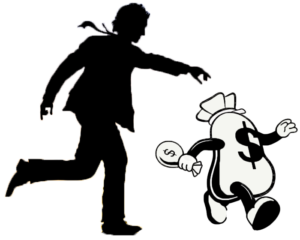
It’s a common practice to measure success in financial terms. Money drives society and our decision process. We are conditioned to value security and prosperity over the prospects of the unknown. Makes sense. But it is not always ultimately fulfilling.
Jeff Bezos had a steady, secure, high-paying position on Wall Street. He could provide for his family and lived a very good lifestyle.

So what made him give all that up?
Why risk security and a financial cushion for retirement in a world that gets increasingly more expensive and challenging to live in? Why throw away safety for the unknown?
Jeff was looking at where his future was heading. He asked himself questions about what he would be missing if he continued down the road he was currently on. What would he regret not having done?
And it wasn’t a completely foolish decision, but it was a big gamble. The Internet was still in its infancy, and online businesses hadn’t been proven yet.
Bezos was someone who was practical, methodical, and smart. He was strong at managing a hedge fund for D.E. Shaw & Company in New York. He was their youngest senior vice president.
When he left, it was for an ungrounded idea that kept nagging at him. On the one hand, it could turn into a steady, secure income for him and his family. On the other hand, it could all go bust.
But Jeff had taken other risks before. As a Princeton graduate with a degree in electrical engineering and computer science, he instead worked on Wall Street in a variety of fields before becoming a hedge fund manager.
He’d already dipped his toes in taking risks, but still, it was not so far out of the box. But selling books online, especially when there was no proven market? Yes, he had done the numbers and seen the potential, but there was still a big hurdle to overcome.
It’s one thing to have an idea about the future. Futurists do this all the time. It’s another to try and get others on board with your vision. And so, Bezos hit a lot of walls and obstacles along the way.
He had trouble getting financing. He had trouble finding the right team. He had trouble supporting himself and his wife. But he was on a path that he created, and he had one other weapon in his arsenal…
Bezos was good at seeing potential opportunity where others could not. And we’ve seen this same thinking many times before.
Preston Tucker with his Tucker automobile. Philo Farnsworth with his television invention. Nikola Tesla with AC electricity. Michael Faraday with electromagnetism. Henry Ford, Milton Hershey, Alan Turing, Marie Curie, Coco Chanel, and so many others. They saw a road others couldn’t.
And it was tough. Financially, it was the hardest road for the Bezos to be on. Finally taking a $250,000 loan from his parents, only to quickly burn through that capital too, and the financial inability to initially hire a bigger team.
At one point, Leonard Riggio, chairman of Barnes & Noble, tried to sue and shut down Bezos company (at the time called, “Cadabra,” then later “relentless.com” – which by the way, forwards right to Amazon.com), because of the claim about being the “World’s Largest Bookstore.” And later, purportedly offered $1 million to buy Bezos out before going public.
Now, obviously, we know the rest of the story, but there are two points to be considered here.
Not every idea is going to become a trillion-dollar idea. And, secondly, the world’s oldest question is; when do you give up on your dream, and when do you keep pushing ahead?
There is no easy way to know exactly when someone should give up or keep going. However, there are indicators along the way.
The first is, are you hoping that your idea will be successful because you’ve seen others do it? If so, you may be chasing money rather than pursuing a real dream. In other words, what’s your motivation for chasing an idea?
Money can often be a roadblock when that is your focus, for several reasons. When you are working towards a goal, and finances get tight, you tend to second guess your choices and decisions, which makes it harder to continue, full steam ahead.

Money should be a byproduct, not the dream. You must first find something that sparks your interest enough to get up every morning and pursue it. You can’t just say I want money. If so, you’ll be throwing darts at everything you think can make you a profit, always jumping ship when things get tough.
Pursuit of a goal or dream that you really desire is best when you’ve done your homework. What do you need in order to follow that goal or objective? And it’s not always money that you need. Many dreams have been fulfilled with little or no capital. Yes, money does offer one breathing room, but when it runs out, do you begin to doubt your choices, or do you dig in and continue moving forward?
So, for now, let’s take money off the table.
You should be asking yourself questions like, what is the learning curve? What tools will I need to pursue my dream? Whom can I find to help me along the way? Can I network with other people who might have insights I can learn from?
You don’t need an existing model to tell you if your dream is viable. Many Disruptors created an entirely new direction or idea through their relentless pursuits, things that never existed before.

But you do need to have an unwavering conviction and belief in yourself. Yes, you will have doubts along the journey, we all do, but ultimately, you must trust in your ability to encounter and overcome obstacles.
I mean, who wants to watch an Olympic or professional athlete who ‘hopes’ they are the best?
The greatest way to trust in your own ability is to stop comparing yourself to others. When you compare, you set yourself up for some really big pitfalls, especially when doubt sets in. You don’t know anything about the other person’s journey, their struggles, who helped them along the way, or how long they pursued their dream. It doesn’t serve you to figure out how Mark Cuban did it. You are not him. You do not have the same circumstances. You are you! Remember that. Make your own road and pursue your own direction.
You can study some tools along the way. Research, gathering information, training, and acquiring new skillsets can only help to benefit your endeavors.
The takeaway here is the word “unknown.” You need to make a choice if you want to stay within the safe boundaries of the known, or venture out and really learn about who you are and what you are ultimately capable of.
The Disruptor cannot live in this safe environment. There’s no opportunity there. He knows that growth, happiness, and opportunity come from traversing the path of the unknown.
A dream is only as big as those willing to nurture it.